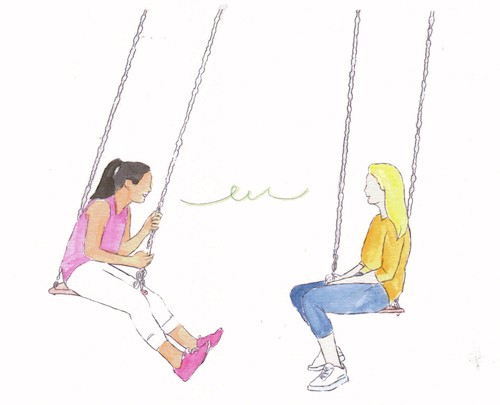
Where disagreements can make our relationships stronger
It seems that recently there are more claims of “I’m listening”, yet many of our arguments surrounding political and social issues are ending in frustration, polarization, and in the most unfortunate of cases a refusal to communicate with those who differ in opinion. Even in the household, our communication skills are being challenged as our patience is tested and personal space is limited — arguments feel draining, more intense, and unproductive.
On the internet, these arguments don’t really matter. But in our personal and professional relationships, how do we talk about disagreement in ways that bring us closer together than push us farther apart?
Even with the best of intentions, maybe we could all use a recap of what meaningful listening looks and feels like so we can avoid harmful arguments.
2 Types of Listening
Thinking about the idea of listening, and better ways to understand what it means, I first turned to Japanese to think about how it could be perceived differently in another language.
I then realized that in the language there are two distinct versions listening. To listen, is read “kiku” for both instances, but there are two different characters for it:
- 聞く: To hear, generally.
- 聴く: To listen, with intention.
Japanese uses the kanji 「聴」when describing listening to music, or listening to lectures. If you look closely you can see on the bottom part there is the kanji for heart, 「心」or ‘kokoro’. This is because the kanji「聴」is used for instances where we’re not just hearing things, but actively listening to seek understanding. But when we say “to listen to arguments” or “to listen to stories”, unfortunately we write it in the first form of the kanji, 「聞」, implying that we simply hear arguments or stories.
But what if we spoke about listening to others in the second form,「聴」, where we are actively listening with the intention of understanding others? What would this do for our conversations and discussions, and the way we get along with one another?

The Most Successful People in Life Know to Listen
The most successful people in life are great at speaking, but they’re also masters of listening. A skill which helps them understand feedback, learn from others, and build strong relationships. Some notable examples of people who understand the importance of effective communication include Ray Dalio and Bill Gates. Both change makers and leaders, people who are able to pull together individuals of differing backgrounds and philosophies to work and share ideas with one another in pursuit of solving problems and reaching goals much bigger than themselves. They’re also exceptional because they’re known to lead stable families, have strong friendships, and be of great influence not just in their professional lives but personal ones too.
“I love Bill because he has a kind heart, listens to other people, and lets himself be moved by what they say. When I tell a story about what I’ve seen, he feels it. He might ask me to gather some data for good measure, but he doesn’t doubt the reality of my experiences or the soundness of my judgment.”
– Melinda Gates
It is my belief that on an individual level when we learn better ways to listen, we find ourselves in better professional opportunities, stronger personal relationships, and find a greater mindfulness and peace in understanding ourselves as we understand our world. On an organizational level, we begin to exchange better ideas, work toward the common good, and develop creative solutions to society’s most pressing problems. And if we could achieve better listening on a global level, well, I think most of the world’s problems would be much easier to solve.
How to Recognize the Different Levels to Listening
- Hearing — you can repeat the content back to them, and understand the words spoken. Your mind is preoccupied with your own opinion, and you are waiting to say your response.
- Listening — you can either empathize with what is being shared, or you are working towards it. You have questions that focus primarily with “why”, and you are constantly reevaluating your own thoughts.
Consider the following situation: Person A likes mochi. Person B thinks that’s a bad opinion to hold because mochi is bad for you.
Listening at Level 1:
Person A: I like to eat mochi, it tastes great.
Person B: No, you shouldn’t like mochi because it’s bad for you. It’s loaded with refined carbs, sticks to your teeth, and causes cavities.
Person A feels invalidated, and they will respond with either sadness or anger, both forms of hurt. It doesn’t matter if Person B has their best intentions at heart, Person A doesn’t feel listened to and it only causes a wider rift between them.
This example might seem trivial — why would any adult bother to tell another person that their opinion of mochi is wrong? — but in cases where the stakes of the topic at hand are higher, this failure to listen leads to the same unproductive conversations. Consider other instances:
On Health
Person A: I always eat breakfast, it’s a great way to start my day.
Person B: You shouldn’t eat breakfast. We don’t actually need it, and it’s just a marketing campaign by Big Food to make us eat more. Have you heard of intermittent fasting? You should try it, it’s the best way to eat.
On Social Issues
Person A: I liked the old Aunt Jemima logo. It brings back good memories.
Person B: You shouldn’t support stuff like that. It supports systemic racism and reinforces dangerous stereotypes about race.
On Personal Choices
Person A: I want to pursue a career in music.
Person B: You shouldn’t go into music. It’s notoriously hard and you’ll make no money. You should go into something like economics or at least marketing, if you want to be in the creative sphere.
Considering the intention of these conversations, these responses sound more reasonable, but they’re actually not that different. The hurt Person A would experience is the exact same way we’d feel if we were told our opinion of mochi was wrong — frustration and anger. While the topics are of higher stakes, the invalidation we would experience is the same, and hence we need a better way to listen so we can move these conversations beyond simple disagreement.

Better Ways to Listen
How would these conversations look different if we practiced active listening?
Where it ends in a mutual understanding
Person A: I like to eat mochi, it tastes great.
Person B:Do you eat it often?
Person A: Not too often, because I know it’s not great for me, but I love it because it reminds me of summer road trips in Japan.
Where it ends in a disagreement
Person A: I like to eat mochi, it tastes great.
Person B: Do you eat it often?
A:Yes, almost every day! It’s so much better for you than bread.
B:That’s interesting, who told you that?
A: I saw something about it on a health blog I follow on Instagram.
B:Interesting, maybe I’m missing something. Share me the link, I’d love to read it.
And with this new insight and line of thinking, hopefully you’ll gain a better understanding of where their opinion and information comes from. You’ll come to see how they’ve developed their way of thinking, and why they believe in the things they believe in.
Other scenarios:
On Health
Person A:I always eat breakfast, it’s a great way to start my day.
Person B: Do you eat breakfast every morning?
Person A:Yup! I do a short workout every morning so I like to eat something after, as I heard it’s good for recovery.
On Social Issues
Person A: I liked the old Aunt Jemima logo. It brings back good memories.
Person B:Do you think that their changing of the logo is dumb?
Person A: Not necessarily, but it’s unfortunate because it has such nice memories. As a family, I would always have it with pancakes on Sunday when I was young.
On Personal Choices
Person A: I want to pursue a career in music.
Person B:Is this something you’ve always wanted to do?
Person A:At least since freshmen year, and it’s all I can think about working on. I honestly haven’t felt this way about any field before.
This sort of dialogue allows more thoughtful discussion and opportunity for mutual understanding. The outcome will most likely not be a black and white answer, but conversations of real substance rarely are. By listening to the multifaceted factors that play into an opinion, we are better capable of understanding each other.
A useful conversation is also listening both ways, so in these cases of better listening, we would also see instances of Person A listening to Person B, and asking questions regarding their stance — Does intermittent fasting not make you too hungry later on? Do you think there are any cases where it is acceptable to use BIPOC on logos? Do you know anyone who fell in love with their marketing career? — considering for just that conversation, that their own stance could be wrong. When we’re listened to, we become more open to listening to others’ thoughts, creating a useful dialogue where we might not necessarily agree in the end but we at least learn and understand each other better.
Listening is a learned and practiced skill, and so here are some guidelines to help:
- Eye contact, and don’t make any funny faces. Making someone feel respected even if you don’t agree is the first step to understanding.
- Ask at least 3 questions before presenting your own opinion.
- Gauge if the other person is willing to engage in a conversation about their opinion. If they don’t respond with a genuine question to your advice or thoughts, then the immediate answer is no, and there is no space for your opinion in this conversation either. This might be frustrating, but letting your thoughts go in silence is an act of listening that’s crucial toward mutual understanding — even if it may not feel so in the moment.
Our strongest opinions aren’t formed in an instant, but are shaped by lifelong experiences, external influences by role models we admire, and environmental circumstances of different things we’re exposed to, so one thoughtful conversation or session of listening is rarely going to change a person’s opinion. But by just challenging our own thoughts and challenging another’s for a moment, we progress towards building stronger relationships with those that matter to us, and a more understanding world where collaborative solutions can form among differences.
